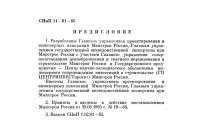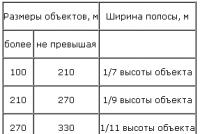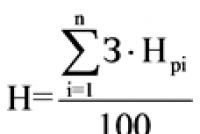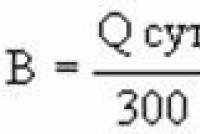The procedure for calculating penalties for electricity. The procedure for calculating and accruing penalties for utilities for late payment. Penalty for light
A law was signed aimed at improving the payment discipline of energy consumers ( the federal law dated November 3, 2015 No. 307-FZ "").
The document establishes solid size penalties for violation by the consumer of obligations to timely pay for energy resources (gas, electricity, heat energy (power) or heat carrier, hot, drinking or technical water), as well as services related to the supply of such resources. The amendments will affect only those consumers, housing organizations and citizens who do not pay for the supplied energy resources for a long time. With regard to a bona fide citizen payer, the law provides for the abolition of penalties in the first month of delay. In the event of a delay from 31 to 90 days, the amount of the current penalty will remain - 1/300 of the refinancing rate, and from 91 days the amount of the penalty will be 1/130 of the refinancing rate of the Bank of Russia of the amount unpaid on time for each day of delay.
At the same time, the amount of the penalty is differentiated for certain categories of consumers and buyers of energy resources (home owners, management organizations of the housing and communal complex, homeowners' associations, housing, housing construction and other specialized consumer cooperatives). For example, for management companies, as well as heat and water supply companies for non-payment of energy resources, the penalty will be 1/300 of the refinancing rate from 1 to 60 days of delay, 1/170 of the refinancing rate - from 61 to 90 days of delay, 1/130 of the refinancing rate - from 91 days overdue. For all other consumers, the penalty is set at 1/130 of the refinancing rate from the first day of delay.
In addition, the Government of the Russian Federation is authorized to establish criteria for determining who have arrears in payment for energy resources of consumers. The latter will be required to provide energy suppliers with security for payment obligations in the form of an independent guarantee.
At the same time, additional conditions were introduced for concluding lease agreements for heat supply facilities, centralized hot water supply systems, cold water supply or sewerage systems, individual objects of such systems that are in state or municipal ownership (conclusion of an energy supply or electricity purchase and sale agreement, provision of bank guarantees for the performance of obligations)
For the specifics of paying for utilities when transferring real estate for free use, see "Encyclopedias of decisions. Contracts and other transactions"internet versions of the GARANT system. Get it for 3 days for free!
The law also provides for:
- strengthening of administrative responsibility for unauthorized connection to electricity and heating networks, oil and gas pipelines. The fine for citizens was increased from 3-4 to 10-15 thousand rubles, for officials - from 6-8 to 30-80 thousand rubles, for legal entities - from 60-80 to 100-200 thousand rubles;
- establishment of administrative liability for violation of the procedure for full or partial limitation of the regime of electricity consumption, the procedure for limiting and stopping the supply of heat energy, supply and withdrawal of gas, or the procedure for temporarily interrupting or limiting water supply, sewerage, transportation of water or wastewater;
- introduction of fines for violation of the established procedure for providing security for the fulfillment of obligations to pay for electric energy (power), gas, heat energy (power) or heat carrier, associated with non-fulfillment (improper fulfillment) of obligations to pay for them.
According to statistics, as of October 1, 2015, the total debt of consumers for energy resources amounted to 850 billion rubles. It is assumed that the adopted amendments will improve payment discipline in the area of \u200b\u200benergy consumption. The changes will come into force 30 days after the day of the official publication of the law, with the exception of a number of norms for which different terms are established. The law was published yesterday (November 4).
The most acute moment in the relationship between consumers of utilities and their suppliers was and remains a delay in payment. Management companies and resource supplying organizations are directly dependent on payments from the population.
If the amount of debt becomes critical, it can simply lead to bankruptcy of the company. Therefore, fines against non-payers - penalties - only grow every year.
In simple terms, a penalty is a penalty that is charged from the debtor for the fact that he has a large delay in utility payments.
The amount of the penalty varies depending on the period during which the consumer does not pay for them. Also, different types of consumers have their own systems for calculating penalties.
How penalties have changed in 2016

Penalty is a penalty for non-payment of utility bills for more than 1 month
In November 2015, Federal Law No. 307-FZ was adopted, which amends the calculation of penalties for late payment of utility bills. The changes entered into force on January 1, 2016 and are generally aimed at improving the discipline of consumers of housing and communal services.
Energy suppliers hope that the amendments will significantly increase the collection of money for housing and communal services. As before, only hard-core debtors will be subject to penalties - those who are more than a month late in payment. That is, you have 30 days to pay the invoice on the receipt.
Terms of accrual and amount of penalty interest
For natural person - that is, for the majority of consumers of utilities - the amount of the penalty will depend on how many days the payment was not made. It used to be like this: penalties were charged if you did not pay by the 10th day of the month following the month of accrual. Now the following scheme works:
- from 31 to 90 days of payment, the amount of the penalty will be the same as before - 1/300 of the refinancing rate of the Central Bank for each day of delay;
- from day 91, penalties will rise to 1/130 of the refinancing rate.
We say "refinancing rate" for convenience, but since January 1, this concept has become obsolete. The Bank of Russia has combined the refinancing rate with key rate, which is currently 7.25% (the rate changes periodically, and we may not have time to keep track of this, so please check the current rate separately on the Internet). It is this figure that is used in calculating the penalty.
Calculation examples for the new system
For ordinary owners of apartments and private houses, the following schemes for calculating penalties are relevant:

The amount of the penalty depends on the number of days when no payment was made
- For example, you owe the management company 6,000 rubles. Starting from the 31st day of delay in payment, you will be charged daily interest in the amount of 6000 * 0.11 * 1/300 \u003d 2.2 rubles. That is, for the first three months (including the first "preferential" month), you will receive 132 rubles of penalty interest.
- Starting from day 91, the penalty rate rises to 1/130 of the rate. If we count the same 6,000 rubles, then in the fourth month you will be charged 5.08 rubles per day. That is, for the fourth and each subsequent month you will have to pay 152.4 rubles. Thus, the penalty for a delay of six months will amount to almost 590 rubles. Keep in mind, however, that you will be charged new utility bills during these months. And if you do not pay for them, then the amount of the penalty will grow significantly.
Penalty differentiation
As already mentioned above, the penalty for late payment of utility bills varies depending on legal status consumer of housing and communal services. For management companies, individuals, legal entities, homeowners associations and building cooperatives, they will be different.
For example, for heat supply organizations, water supply and sewerage enterprises, management companies, the fines will be as follows:
- from 1 to 60 days of delay in payment - 1/300 of the refinancing rate (key);
- from 61 to 90 days - 1/170 of the bet;
- from day 91 onwards - 1/130 of the refinancing rate of the Bank of Russia.
For legal entities, not related to the above-mentioned industries, homeowners associations, housing construction cooperatives, the penalty will be the same - 1/130 of the refinancing rate, starting from the first day.
If you have an advance payment system for housing and communal services, then the specific terms for calculating penalties may differ. It is best to clarify them with your service organization - UK or HOA.
What else has the new law brought

In addition to calculating penalties, they can also turn off utilities for non-payment
In addition to changing the system for calculating and collecting penalties for late payment of utility bills, amendments to the legislation touched on another punishment for violators.
As you know, in addition to penalties, resource supplying organizations have the right to restrict or completely stop the supply of electricity, heat, water and gas. Of course, there will be several warnings before cutting off the consumer from the energy resource.
Usually the first measure of influence is to turn off the light in an apartment, private house or the whole building. It is not uncommon for residents to unauthorizedly connect after a visit from an electrician and cutting wires. Such actions are a violation not only of the current legislation, but also of safety measures. Therefore, the amendments to the law significantly increased the fines for such arbitrariness.
Now, if an independent connection to electricity and heating networks was recorded, the fines will be:
- for individuals - 10-15 thousand rubles (there were 3– thousand);
- for officials, the collection increased to 30-80 thousand rubles;
- legal entities will have to pay from 100 to 200 thousand rubles for arbitrariness.
Is it possible to avoid the accrual of interest
In some situations, penalties for late utility bills can be avoided. If you have to leave the city for a long time, then you should first visit management company and write a corresponding statement. After that, you will not be charged interest if the apartment is really empty.
This delay is valid for only six months. If you are planning to leave for a longer period, then the next application can be sent by mail.
Remember that you will be recalculated only for electricity, water, gas and water disposal. You will have to pay for heating and maintenance of common areas anyway.
Penalty recalculation and cancellation can be done even after you have left for a long time. But you can't hesitate here: according to the law, an application can be written only within a month after your return. In addition, as confirmation of your absence, you must provide evidence: travel documents, a certificate of sanatorium treatment, etc.
Light / Power outage
In 2016, Russia tightened sanctions for non-payers for utilities and resources. Now it is even less profitable to accumulate debts for electricity. The late payment interest increases proportionally depending on how long the payment of the energy resource is delayed.
How is the penalty calculated for electricity debt?
The legislation establishes the following procedure: the presence of an unpaid invoice during the first month remains without consequences, but from the second month penalties are charged.
Suppose a consumer has accumulated a debt of five thousand rubles, the delay is 150 days. The refinancing rate of the Central Bank for today is 9%. For the first 30 days, penalty interest is not charged.
For the next 60 days, penalties are calculated as follows: 5000 (the amount of debt) is multiplied by 60 (the number of days of delay), the resulting number is multiplied by 9 (the refinancing rate) and divided by 300. The total number is obtained in kopecks, so it must be divided by 100. The penalty will be 90 rubles.
If the delay exceeds 150 days, then over the next 60 days the amount of the penalty more than doubles: you need to divide the resulting number not by 300, but by 130. If you add here charges for monthly electricity consumption, the amount of debt can be quite impressive.
Under what conditions can you turn off the electricity for debts?
If the consumer ignores the payment, then the resource provider has the right to apply to the courts. According to the court, not only the main debt is collected, but also legal costs, that is, in addition to the main debt, the client will also have to pay the state duty.
If the debt for electricity exceeds the sum of two monthly fees calculated on the basis of the consumption rate, the power supply company has the right to limit the power supply. This rule applies to all clients, regardless of the presence of a counter. That is, if a consumer uses electricity more than twice the norm in a month, they will be able to disconnect him from the network as early as next month if he does not pay on time.
The "standard" is an average indicator, and it, as a rule, differs from actual consumption, is set by regional authorities and may differ in different subjects of the federation. For example, in the Moscow region, for two people living in a two-room apartment in a house with gas stoves, it is 88 kilowatt-hours per person.
The amount of debt due to which residents can turn off the electricity is calculated as follows:
88 kilowatt-hours (standard) is multiplied by two (the number of residents), multiplied by two months, then multiplied by the tariff (5.04 rubles per kilowatt-hour).
It turns out 1774.08 rubles. If the amount owed exceeds this number, the power supply company has the right to limit or disconnect the apartment from the power supply.
Electricity can be returned only after payment of the debt and expenses of the grid organization for technical measures to disconnect / connect the facility to the power grid. Depending on the distance, the type of restriction and the complexity of the work, the amount can range from one to six thousand rubles.
They can also arrest or confiscate property from hard-core defaulters, seize funds in bank accounts, including credit cards... In addition, debtors will not be able to travel abroad or get a bank loan.
Unlike many goods, the purchase of electricity is a more “complicated” thing: it is impossible to buy it in advance and spend exactly as much as it was bought.
This often leads to indebtedness among consumers: without calculating spending in advance, they can get a bigger bill than they planned, and may not be able to pay it.
How to pay
 It is not difficult to pay for electricity: you need to take the meter readings of an apartment or house every month, subtract the amount spent for this period and multiply the number by the tariff used.
It is not difficult to pay for electricity: you need to take the meter readings of an apartment or house every month, subtract the amount spent for this period and multiply the number by the tariff used.
The latter can be found on the supplier's website or by phone.
Payment can be made by:
- a receipt sent by the energy supplier;
- paybook - it is filled in by the consumer himself, while the suppliers from time to time check and bill for the energy spent, but not paid;
- prepayment card - it is often used by firms and enterprises in order not to wait for full payment.
In the latter case, payment is made in installments:
- 30% of payment must be received by the 10th of the month;
- 40% - by the 25th of the same month;
- the remaining amount must be posted by the 18th next monthwhen the complete settlement of the supplier and the consumer occurs.
If it turns out that the consumer paid more than he spent, the difference goes into the next month's advance payment.
Its useful to note: the contract may indicate other payment terms, but the supplier has no right to demand payment earlier than the above terms.
Payment from an individual takes place in 2 stages:
- By the 26th of each month, you must take the meter readings. This should be done on the same day so that there is no confusion.
- By the 15th day of the next month, full payment must be made using the methods below.
If the supplier provides for other terms, for example, payment every few months, you need to adjust to them.
Payment can be made:

When can they turn off

 Any energy consumption occurs on the basis of an electricity supply agreement concluded between the supplier and the consumer.
Any energy consumption occurs on the basis of an electricity supply agreement concluded between the supplier and the consumer.
It is valid for 3 years and is renewed for a year after the end of this period, and it can also be terminated one month before the deadline.
The contract also prescribes all the nuances: payment terms, tariffs, the amount of interest charged for late payment, etc. Failure to pay is the non-receipt of money to the supplier's account within the period established by the contract and law.
If this happens, the supplier takes the following steps:
- After 20 days from the last date, the consumer is sent a warning about a possible power outage if the money is not paid.
- 30 days after the notification is sent, if the consumer does not pay the bill, it may be disabled. They cannot turn off the electricity before weekends or holidays.

 If the consumer cannot pay the entire amount at once, he must contact the electricity supplier with a request for a deferral or installment payment.
If the consumer cannot pay the entire amount at once, he must contact the electricity supplier with a request for a deferral or installment payment.
The application must be accompanied by documents testifying to a difficult financial situation: a certificate from work or employment about dismissal, an extract of the receipt of a pension, etc.
Take into account: the specified 30 days are calculated from the moment the notification was sent to the recipient, and not from the moment of receipt: if the letter gets lost in the mail, the disconnection will still occur on time.
In addition to power outages, there is another way to punish debtors - this is a penalty. This is a penalty or fine that the debtor must pay for late payment of utilities or other services.
In this case, the amount of the penalty depends on the number of overdue days:

You can find out the exact amount to be paid from the supplier himself before paying, or use special online calculators so as not to be mistaken.






